AHPRA Registered Nurse Standards of Practice Reflection Essay
VerifiedAdded on 2023/06/03
|8
|1912
|480
Essay
AI Summary
This essay critically reflects on two Registered Nurse Standards of Practice as defined by the Nursing and Midwifery Board of Australia (NMBA): critical thinking and analysis of nursing practice, and engaging in therapeutic and professional relationships. It emphasizes the importance of these standards in enhancing the quality of nursing care. The reflection draws upon experiences from an undergraduate nursing clinical practice, highlighting how these standards manifest in real-world scenarios. The essay underscores the significance of reflective practice in identifying areas for improvement and integrating NMBA standards to achieve optimal health outcomes, concluding that a deep understanding of nursing concepts and theories is essential for effective application of these standards in clinical settings.
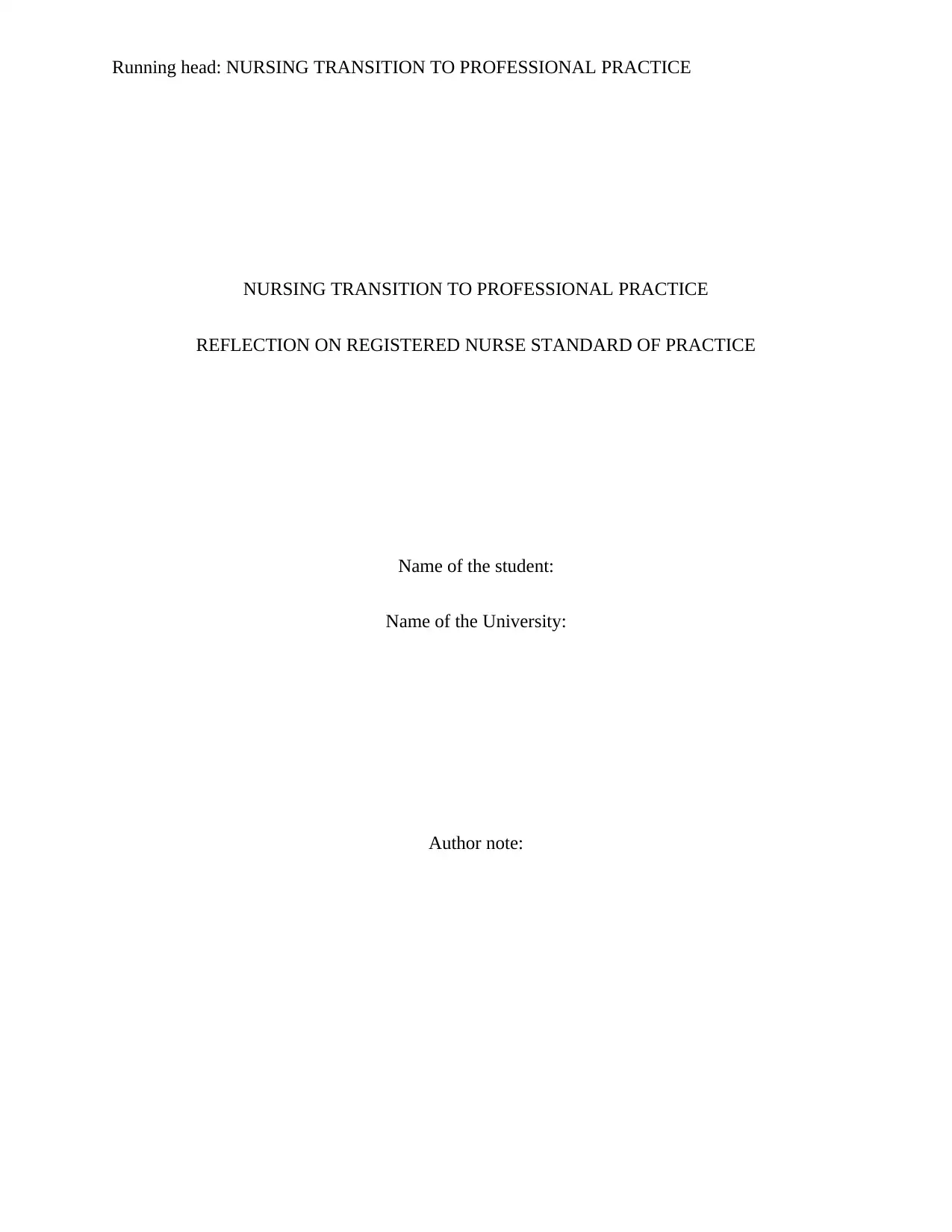
Running head: NURSING TRANSITION TO PROFESSIONAL PRACTICE
NURSING TRANSITION TO PROFESSIONAL PRACTICE
REFLECTION ON REGISTERED NURSE STANDARD OF PRACTICE
Name of the student:
Name of the University:
Author note:
NURSING TRANSITION TO PROFESSIONAL PRACTICE
REFLECTION ON REGISTERED NURSE STANDARD OF PRACTICE
Name of the student:
Name of the University:
Author note:
Paraphrase This Document
Need a fresh take? Get an instant paraphrase of this document with our AI Paraphraser
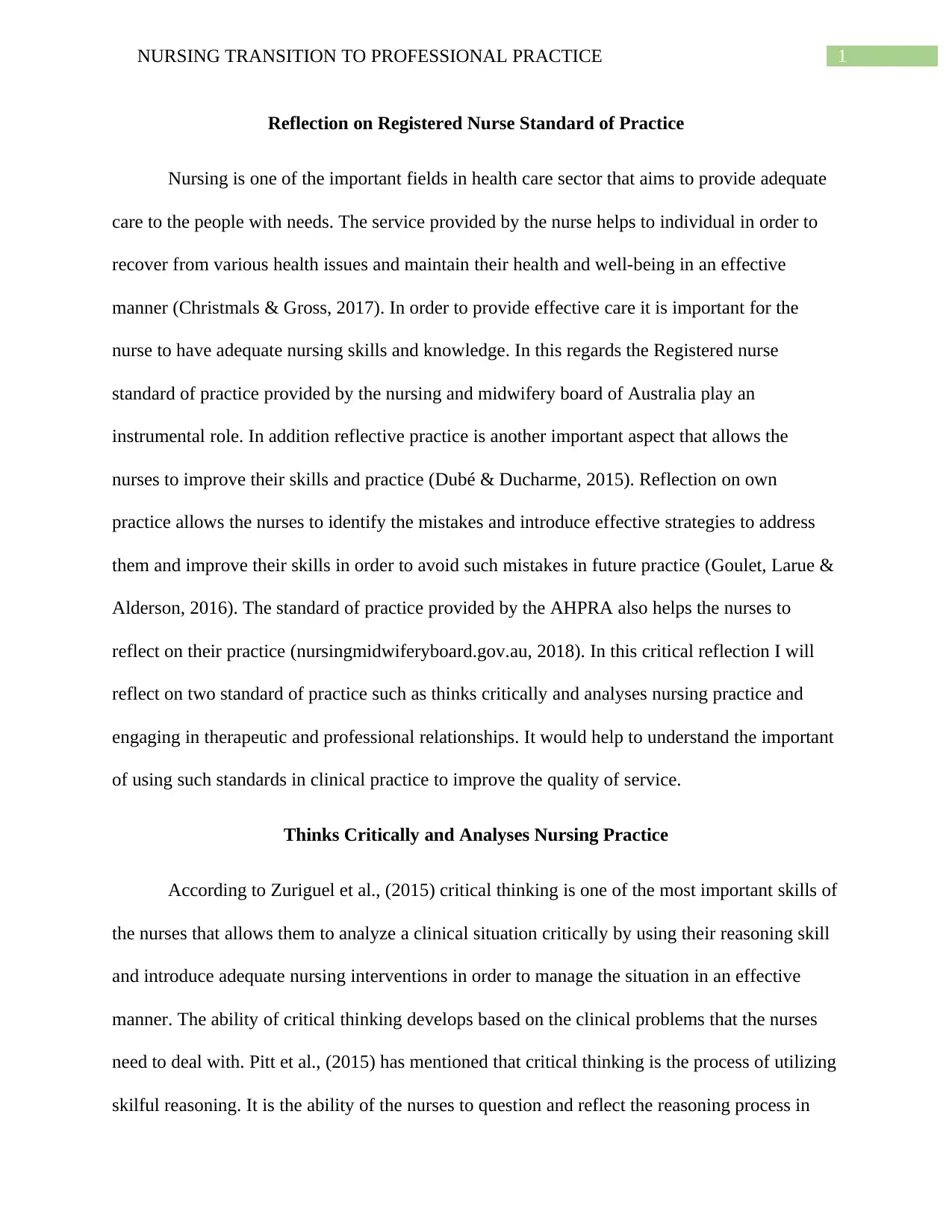
1NURSING TRANSITION TO PROFESSIONAL PRACTICE
Reflection on Registered Nurse Standard of Practice
Nursing is one of the important fields in health care sector that aims to provide adequate
care to the people with needs. The service provided by the nurse helps to individual in order to
recover from various health issues and maintain their health and well-being in an effective
manner (Christmals & Gross, 2017). In order to provide effective care it is important for the
nurse to have adequate nursing skills and knowledge. In this regards the Registered nurse
standard of practice provided by the nursing and midwifery board of Australia play an
instrumental role. In addition reflective practice is another important aspect that allows the
nurses to improve their skills and practice (Dubé & Ducharme, 2015). Reflection on own
practice allows the nurses to identify the mistakes and introduce effective strategies to address
them and improve their skills in order to avoid such mistakes in future practice (Goulet, Larue &
Alderson, 2016). The standard of practice provided by the AHPRA also helps the nurses to
reflect on their practice (nursingmidwiferyboard.gov.au, 2018). In this critical reflection I will
reflect on two standard of practice such as thinks critically and analyses nursing practice and
engaging in therapeutic and professional relationships. It would help to understand the important
of using such standards in clinical practice to improve the quality of service.
Thinks Critically and Analyses Nursing Practice
According to Zuriguel et al., (2015) critical thinking is one of the most important skills of
the nurses that allows them to analyze a clinical situation critically by using their reasoning skill
and introduce adequate nursing interventions in order to manage the situation in an effective
manner. The ability of critical thinking develops based on the clinical problems that the nurses
need to deal with. Pitt et al., (2015) has mentioned that critical thinking is the process of utilizing
skilful reasoning. It is the ability of the nurses to question and reflect the reasoning process in
Reflection on Registered Nurse Standard of Practice
Nursing is one of the important fields in health care sector that aims to provide adequate
care to the people with needs. The service provided by the nurse helps to individual in order to
recover from various health issues and maintain their health and well-being in an effective
manner (Christmals & Gross, 2017). In order to provide effective care it is important for the
nurse to have adequate nursing skills and knowledge. In this regards the Registered nurse
standard of practice provided by the nursing and midwifery board of Australia play an
instrumental role. In addition reflective practice is another important aspect that allows the
nurses to improve their skills and practice (Dubé & Ducharme, 2015). Reflection on own
practice allows the nurses to identify the mistakes and introduce effective strategies to address
them and improve their skills in order to avoid such mistakes in future practice (Goulet, Larue &
Alderson, 2016). The standard of practice provided by the AHPRA also helps the nurses to
reflect on their practice (nursingmidwiferyboard.gov.au, 2018). In this critical reflection I will
reflect on two standard of practice such as thinks critically and analyses nursing practice and
engaging in therapeutic and professional relationships. It would help to understand the important
of using such standards in clinical practice to improve the quality of service.
Thinks Critically and Analyses Nursing Practice
According to Zuriguel et al., (2015) critical thinking is one of the most important skills of
the nurses that allows them to analyze a clinical situation critically by using their reasoning skill
and introduce adequate nursing interventions in order to manage the situation in an effective
manner. The ability of critical thinking develops based on the clinical problems that the nurses
need to deal with. Pitt et al., (2015) has mentioned that critical thinking is the process of utilizing
skilful reasoning. It is the ability of the nurses to question and reflect the reasoning process in
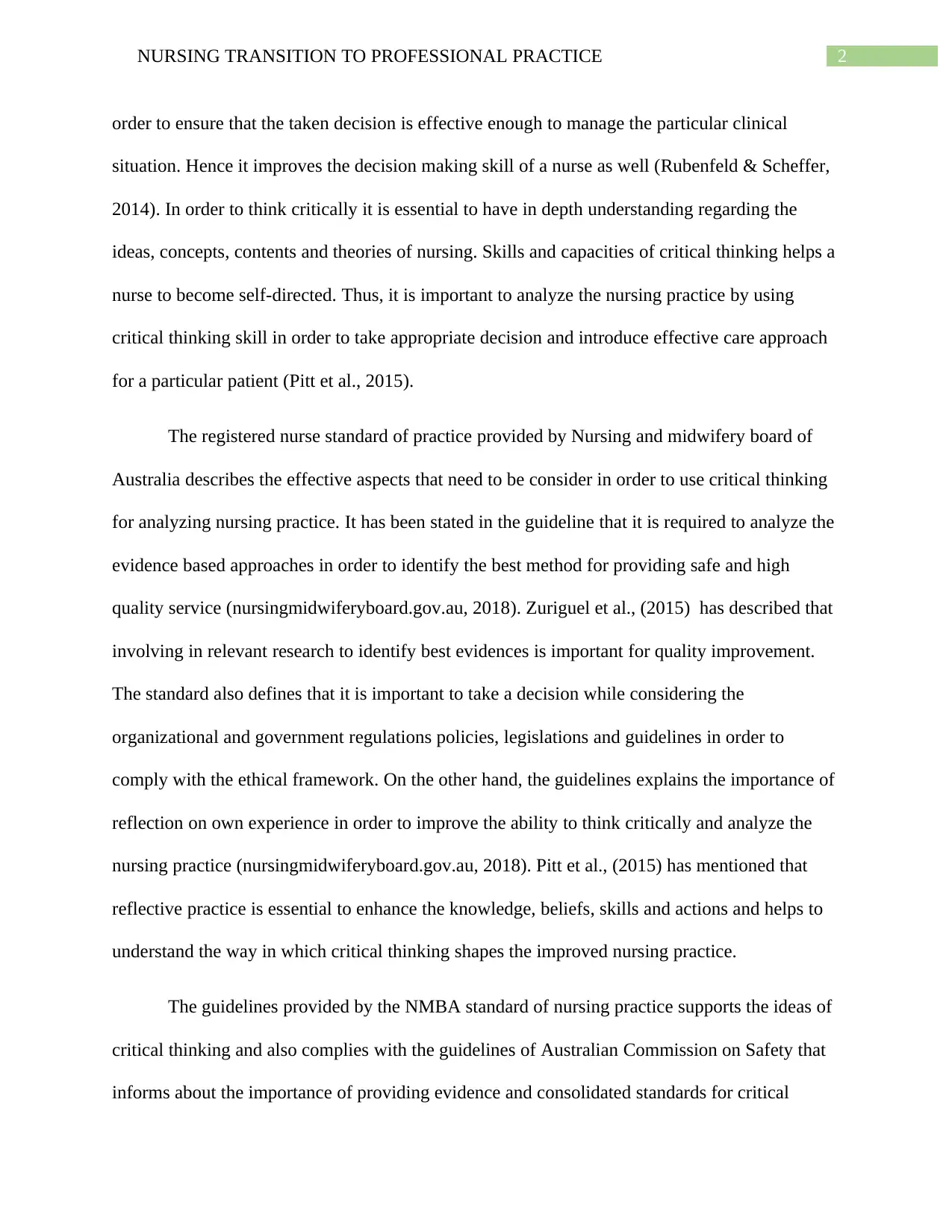
2NURSING TRANSITION TO PROFESSIONAL PRACTICE
order to ensure that the taken decision is effective enough to manage the particular clinical
situation. Hence it improves the decision making skill of a nurse as well (Rubenfeld & Scheffer,
2014). In order to think critically it is essential to have in depth understanding regarding the
ideas, concepts, contents and theories of nursing. Skills and capacities of critical thinking helps a
nurse to become self-directed. Thus, it is important to analyze the nursing practice by using
critical thinking skill in order to take appropriate decision and introduce effective care approach
for a particular patient (Pitt et al., 2015).
The registered nurse standard of practice provided by Nursing and midwifery board of
Australia describes the effective aspects that need to be consider in order to use critical thinking
for analyzing nursing practice. It has been stated in the guideline that it is required to analyze the
evidence based approaches in order to identify the best method for providing safe and high
quality service (nursingmidwiferyboard.gov.au, 2018). Zuriguel et al., (2015) has described that
involving in relevant research to identify best evidences is important for quality improvement.
The standard also defines that it is important to take a decision while considering the
organizational and government regulations policies, legislations and guidelines in order to
comply with the ethical framework. On the other hand, the guidelines explains the importance of
reflection on own experience in order to improve the ability to think critically and analyze the
nursing practice (nursingmidwiferyboard.gov.au, 2018). Pitt et al., (2015) has mentioned that
reflective practice is essential to enhance the knowledge, beliefs, skills and actions and helps to
understand the way in which critical thinking shapes the improved nursing practice.
The guidelines provided by the NMBA standard of nursing practice supports the ideas of
critical thinking and also complies with the guidelines of Australian Commission on Safety that
informs about the importance of providing evidence and consolidated standards for critical
order to ensure that the taken decision is effective enough to manage the particular clinical
situation. Hence it improves the decision making skill of a nurse as well (Rubenfeld & Scheffer,
2014). In order to think critically it is essential to have in depth understanding regarding the
ideas, concepts, contents and theories of nursing. Skills and capacities of critical thinking helps a
nurse to become self-directed. Thus, it is important to analyze the nursing practice by using
critical thinking skill in order to take appropriate decision and introduce effective care approach
for a particular patient (Pitt et al., 2015).
The registered nurse standard of practice provided by Nursing and midwifery board of
Australia describes the effective aspects that need to be consider in order to use critical thinking
for analyzing nursing practice. It has been stated in the guideline that it is required to analyze the
evidence based approaches in order to identify the best method for providing safe and high
quality service (nursingmidwiferyboard.gov.au, 2018). Zuriguel et al., (2015) has described that
involving in relevant research to identify best evidences is important for quality improvement.
The standard also defines that it is important to take a decision while considering the
organizational and government regulations policies, legislations and guidelines in order to
comply with the ethical framework. On the other hand, the guidelines explains the importance of
reflection on own experience in order to improve the ability to think critically and analyze the
nursing practice (nursingmidwiferyboard.gov.au, 2018). Pitt et al., (2015) has mentioned that
reflective practice is essential to enhance the knowledge, beliefs, skills and actions and helps to
understand the way in which critical thinking shapes the improved nursing practice.
The guidelines provided by the NMBA standard of nursing practice supports the ideas of
critical thinking and also complies with the guidelines of Australian Commission on Safety that
informs about the importance of providing evidence and consolidated standards for critical
⊘ This is a preview!⊘
Do you want full access?
Subscribe today to unlock all pages.

Trusted by 1+ million students worldwide
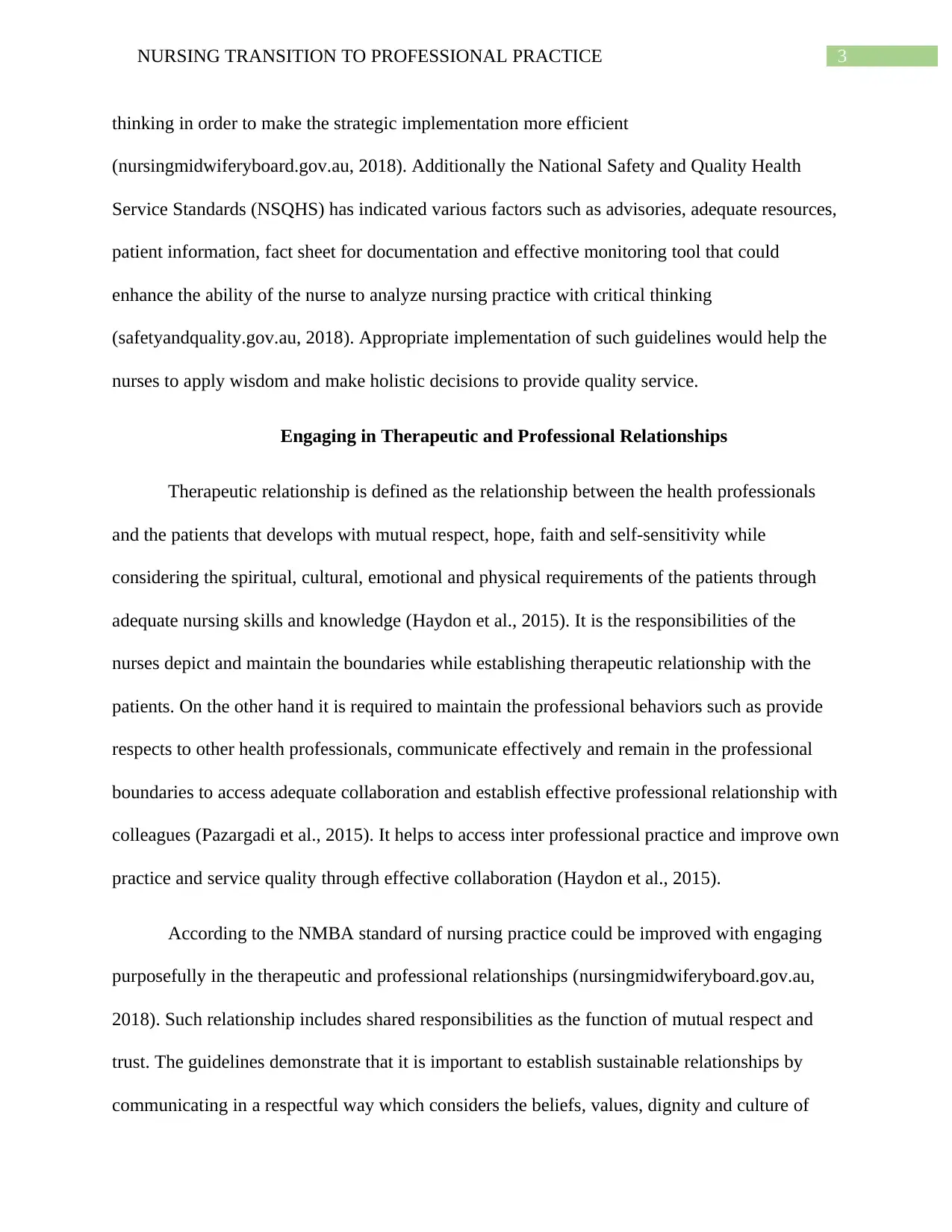
3NURSING TRANSITION TO PROFESSIONAL PRACTICE
thinking in order to make the strategic implementation more efficient
(nursingmidwiferyboard.gov.au, 2018). Additionally the National Safety and Quality Health
Service Standards (NSQHS) has indicated various factors such as advisories, adequate resources,
patient information, fact sheet for documentation and effective monitoring tool that could
enhance the ability of the nurse to analyze nursing practice with critical thinking
(safetyandquality.gov.au, 2018). Appropriate implementation of such guidelines would help the
nurses to apply wisdom and make holistic decisions to provide quality service.
Engaging in Therapeutic and Professional Relationships
Therapeutic relationship is defined as the relationship between the health professionals
and the patients that develops with mutual respect, hope, faith and self-sensitivity while
considering the spiritual, cultural, emotional and physical requirements of the patients through
adequate nursing skills and knowledge (Haydon et al., 2015). It is the responsibilities of the
nurses depict and maintain the boundaries while establishing therapeutic relationship with the
patients. On the other hand it is required to maintain the professional behaviors such as provide
respects to other health professionals, communicate effectively and remain in the professional
boundaries to access adequate collaboration and establish effective professional relationship with
colleagues (Pazargadi et al., 2015). It helps to access inter professional practice and improve own
practice and service quality through effective collaboration (Haydon et al., 2015).
According to the NMBA standard of nursing practice could be improved with engaging
purposefully in the therapeutic and professional relationships (nursingmidwiferyboard.gov.au,
2018). Such relationship includes shared responsibilities as the function of mutual respect and
trust. The guidelines demonstrate that it is important to establish sustainable relationships by
communicating in a respectful way which considers the beliefs, values, dignity and culture of
thinking in order to make the strategic implementation more efficient
(nursingmidwiferyboard.gov.au, 2018). Additionally the National Safety and Quality Health
Service Standards (NSQHS) has indicated various factors such as advisories, adequate resources,
patient information, fact sheet for documentation and effective monitoring tool that could
enhance the ability of the nurse to analyze nursing practice with critical thinking
(safetyandquality.gov.au, 2018). Appropriate implementation of such guidelines would help the
nurses to apply wisdom and make holistic decisions to provide quality service.
Engaging in Therapeutic and Professional Relationships
Therapeutic relationship is defined as the relationship between the health professionals
and the patients that develops with mutual respect, hope, faith and self-sensitivity while
considering the spiritual, cultural, emotional and physical requirements of the patients through
adequate nursing skills and knowledge (Haydon et al., 2015). It is the responsibilities of the
nurses depict and maintain the boundaries while establishing therapeutic relationship with the
patients. On the other hand it is required to maintain the professional behaviors such as provide
respects to other health professionals, communicate effectively and remain in the professional
boundaries to access adequate collaboration and establish effective professional relationship with
colleagues (Pazargadi et al., 2015). It helps to access inter professional practice and improve own
practice and service quality through effective collaboration (Haydon et al., 2015).
According to the NMBA standard of nursing practice could be improved with engaging
purposefully in the therapeutic and professional relationships (nursingmidwiferyboard.gov.au,
2018). Such relationship includes shared responsibilities as the function of mutual respect and
trust. The guidelines demonstrate that it is important to establish sustainable relationships by
communicating in a respectful way which considers the beliefs, values, dignity and culture of
Paraphrase This Document
Need a fresh take? Get an instant paraphrase of this document with our AI Paraphraser
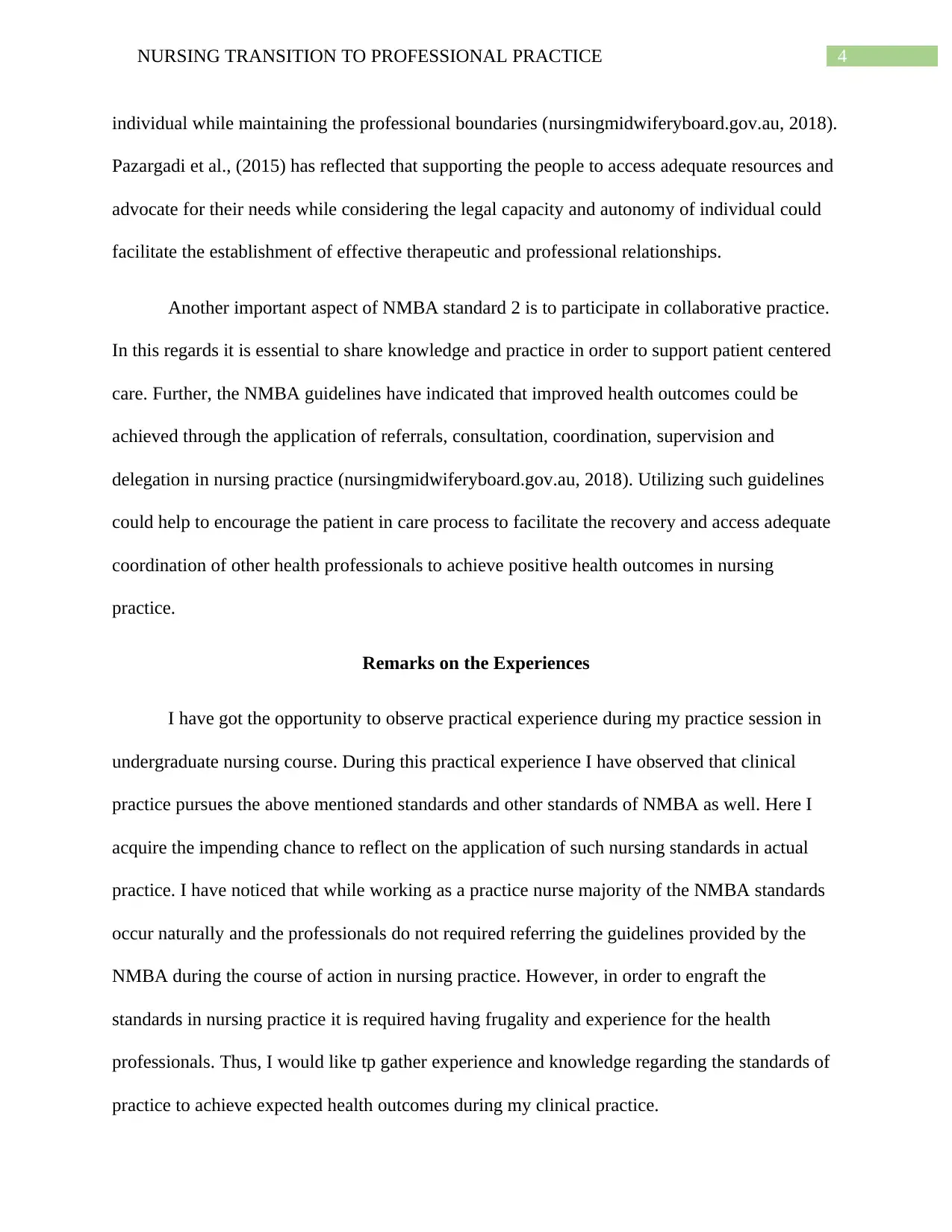
4NURSING TRANSITION TO PROFESSIONAL PRACTICE
individual while maintaining the professional boundaries (nursingmidwiferyboard.gov.au, 2018).
Pazargadi et al., (2015) has reflected that supporting the people to access adequate resources and
advocate for their needs while considering the legal capacity and autonomy of individual could
facilitate the establishment of effective therapeutic and professional relationships.
Another important aspect of NMBA standard 2 is to participate in collaborative practice.
In this regards it is essential to share knowledge and practice in order to support patient centered
care. Further, the NMBA guidelines have indicated that improved health outcomes could be
achieved through the application of referrals, consultation, coordination, supervision and
delegation in nursing practice (nursingmidwiferyboard.gov.au, 2018). Utilizing such guidelines
could help to encourage the patient in care process to facilitate the recovery and access adequate
coordination of other health professionals to achieve positive health outcomes in nursing
practice.
Remarks on the Experiences
I have got the opportunity to observe practical experience during my practice session in
undergraduate nursing course. During this practical experience I have observed that clinical
practice pursues the above mentioned standards and other standards of NMBA as well. Here I
acquire the impending chance to reflect on the application of such nursing standards in actual
practice. I have noticed that while working as a practice nurse majority of the NMBA standards
occur naturally and the professionals do not required referring the guidelines provided by the
NMBA during the course of action in nursing practice. However, in order to engraft the
standards in nursing practice it is required having frugality and experience for the health
professionals. Thus, I would like tp gather experience and knowledge regarding the standards of
practice to achieve expected health outcomes during my clinical practice.
individual while maintaining the professional boundaries (nursingmidwiferyboard.gov.au, 2018).
Pazargadi et al., (2015) has reflected that supporting the people to access adequate resources and
advocate for their needs while considering the legal capacity and autonomy of individual could
facilitate the establishment of effective therapeutic and professional relationships.
Another important aspect of NMBA standard 2 is to participate in collaborative practice.
In this regards it is essential to share knowledge and practice in order to support patient centered
care. Further, the NMBA guidelines have indicated that improved health outcomes could be
achieved through the application of referrals, consultation, coordination, supervision and
delegation in nursing practice (nursingmidwiferyboard.gov.au, 2018). Utilizing such guidelines
could help to encourage the patient in care process to facilitate the recovery and access adequate
coordination of other health professionals to achieve positive health outcomes in nursing
practice.
Remarks on the Experiences
I have got the opportunity to observe practical experience during my practice session in
undergraduate nursing course. During this practical experience I have observed that clinical
practice pursues the above mentioned standards and other standards of NMBA as well. Here I
acquire the impending chance to reflect on the application of such nursing standards in actual
practice. I have noticed that while working as a practice nurse majority of the NMBA standards
occur naturally and the professionals do not required referring the guidelines provided by the
NMBA during the course of action in nursing practice. However, in order to engraft the
standards in nursing practice it is required having frugality and experience for the health
professionals. Thus, I would like tp gather experience and knowledge regarding the standards of
practice to achieve expected health outcomes during my clinical practice.
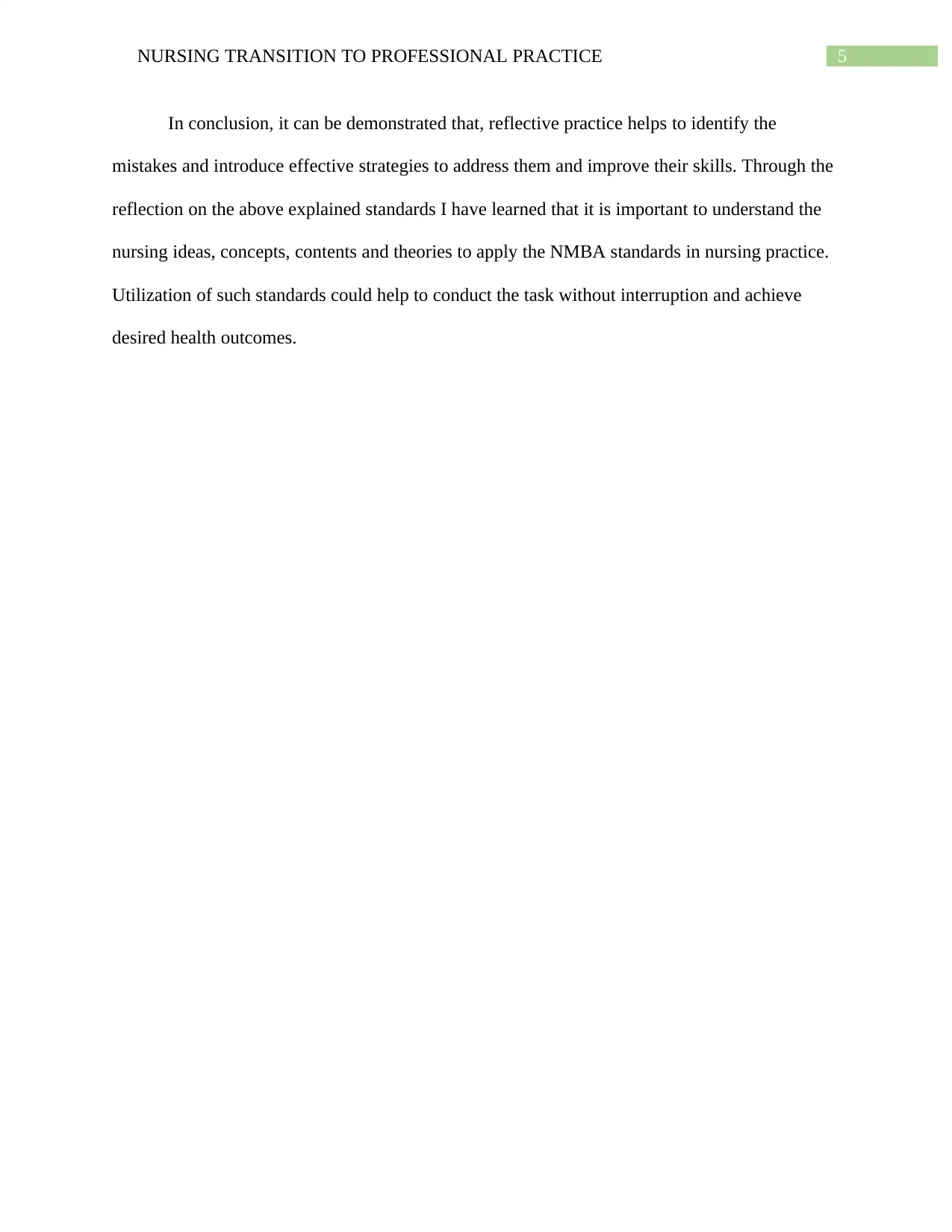
5NURSING TRANSITION TO PROFESSIONAL PRACTICE
In conclusion, it can be demonstrated that, reflective practice helps to identify the
mistakes and introduce effective strategies to address them and improve their skills. Through the
reflection on the above explained standards I have learned that it is important to understand the
nursing ideas, concepts, contents and theories to apply the NMBA standards in nursing practice.
Utilization of such standards could help to conduct the task without interruption and achieve
desired health outcomes.
In conclusion, it can be demonstrated that, reflective practice helps to identify the
mistakes and introduce effective strategies to address them and improve their skills. Through the
reflection on the above explained standards I have learned that it is important to understand the
nursing ideas, concepts, contents and theories to apply the NMBA standards in nursing practice.
Utilization of such standards could help to conduct the task without interruption and achieve
desired health outcomes.
⊘ This is a preview!⊘
Do you want full access?
Subscribe today to unlock all pages.

Trusted by 1+ million students worldwide
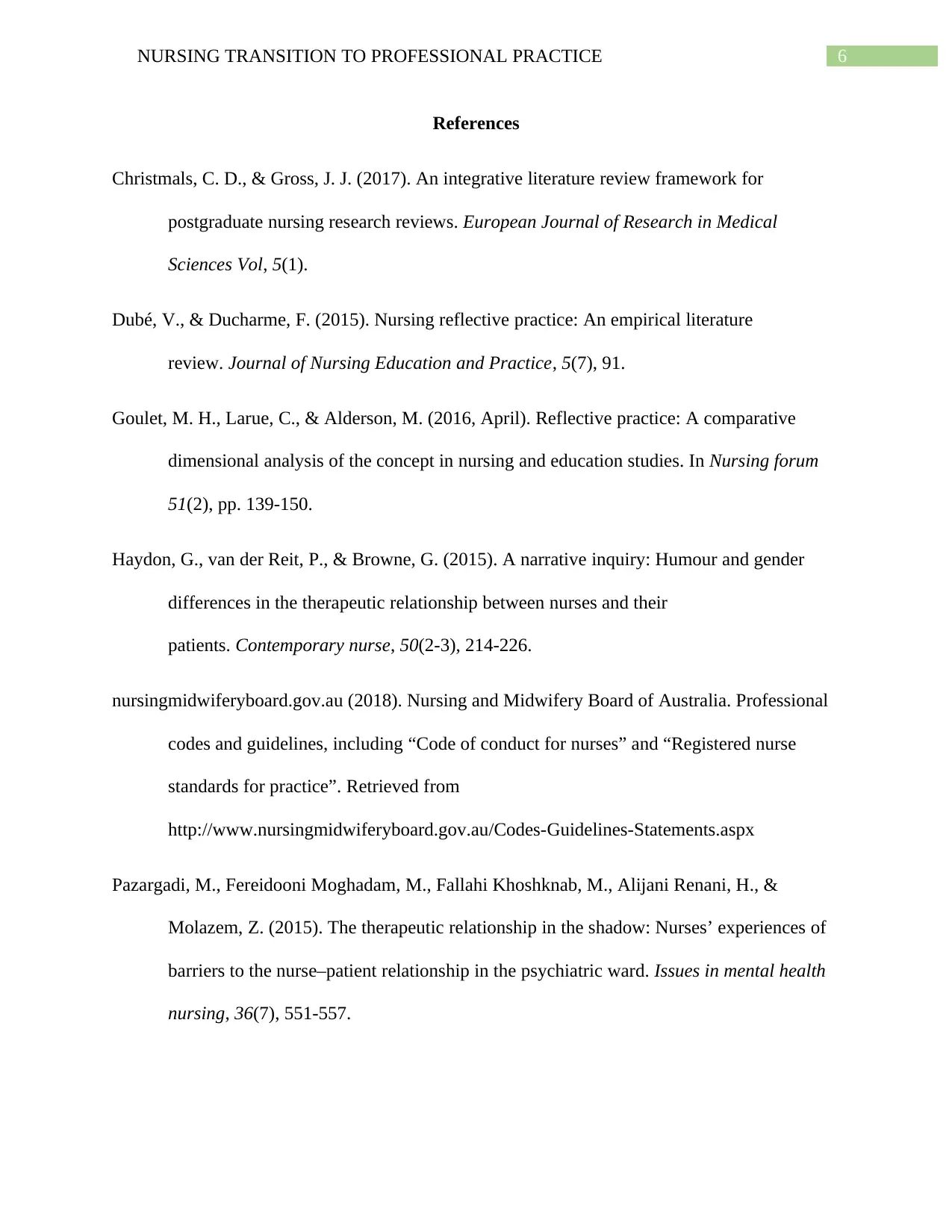
6NURSING TRANSITION TO PROFESSIONAL PRACTICE
References
Christmals, C. D., & Gross, J. J. (2017). An integrative literature review framework for
postgraduate nursing research reviews. European Journal of Research in Medical
Sciences Vol, 5(1).
Dubé, V., & Ducharme, F. (2015). Nursing reflective practice: An empirical literature
review. Journal of Nursing Education and Practice, 5(7), 91.
Goulet, M. H., Larue, C., & Alderson, M. (2016, April). Reflective practice: A comparative
dimensional analysis of the concept in nursing and education studies. In Nursing forum
51(2), pp. 139-150.
Haydon, G., van der Reit, P., & Browne, G. (2015). A narrative inquiry: Humour and gender
differences in the therapeutic relationship between nurses and their
patients. Contemporary nurse, 50(2-3), 214-226.
nursingmidwiferyboard.gov.au (2018). Nursing and Midwifery Board of Australia. Professional
codes and guidelines, including “Code of conduct for nurses” and “Registered nurse
standards for practice”. Retrieved from
http://www.nursingmidwiferyboard.gov.au/Codes-Guidelines-Statements.aspx
Pazargadi, M., Fereidooni Moghadam, M., Fallahi Khoshknab, M., Alijani Renani, H., &
Molazem, Z. (2015). The therapeutic relationship in the shadow: Nurses’ experiences of
barriers to the nurse–patient relationship in the psychiatric ward. Issues in mental health
nursing, 36(7), 551-557.
References
Christmals, C. D., & Gross, J. J. (2017). An integrative literature review framework for
postgraduate nursing research reviews. European Journal of Research in Medical
Sciences Vol, 5(1).
Dubé, V., & Ducharme, F. (2015). Nursing reflective practice: An empirical literature
review. Journal of Nursing Education and Practice, 5(7), 91.
Goulet, M. H., Larue, C., & Alderson, M. (2016, April). Reflective practice: A comparative
dimensional analysis of the concept in nursing and education studies. In Nursing forum
51(2), pp. 139-150.
Haydon, G., van der Reit, P., & Browne, G. (2015). A narrative inquiry: Humour and gender
differences in the therapeutic relationship between nurses and their
patients. Contemporary nurse, 50(2-3), 214-226.
nursingmidwiferyboard.gov.au (2018). Nursing and Midwifery Board of Australia. Professional
codes and guidelines, including “Code of conduct for nurses” and “Registered nurse
standards for practice”. Retrieved from
http://www.nursingmidwiferyboard.gov.au/Codes-Guidelines-Statements.aspx
Pazargadi, M., Fereidooni Moghadam, M., Fallahi Khoshknab, M., Alijani Renani, H., &
Molazem, Z. (2015). The therapeutic relationship in the shadow: Nurses’ experiences of
barriers to the nurse–patient relationship in the psychiatric ward. Issues in mental health
nursing, 36(7), 551-557.
Paraphrase This Document
Need a fresh take? Get an instant paraphrase of this document with our AI Paraphraser
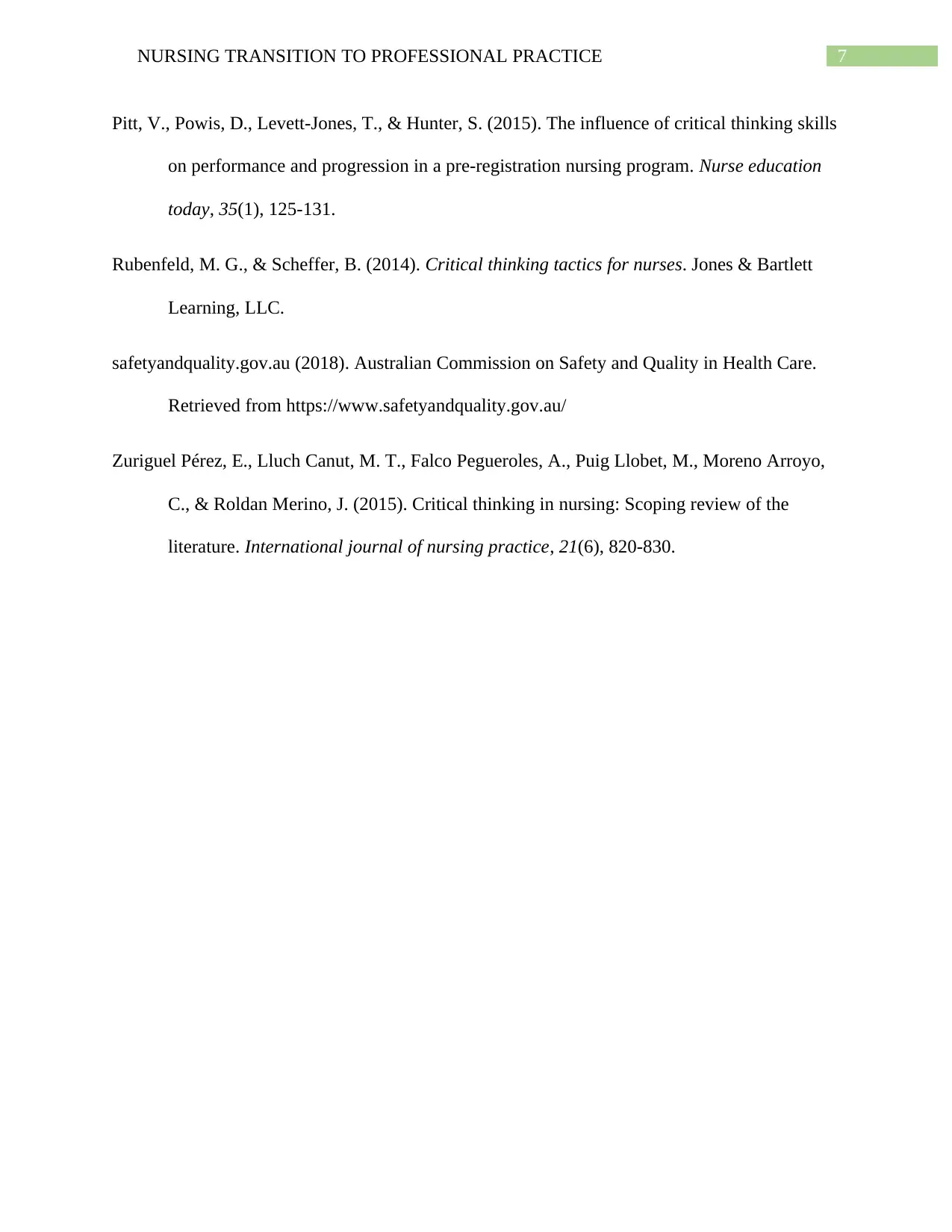
7NURSING TRANSITION TO PROFESSIONAL PRACTICE
Pitt, V., Powis, D., Levett-Jones, T., & Hunter, S. (2015). The influence of critical thinking skills
on performance and progression in a pre-registration nursing program. Nurse education
today, 35(1), 125-131.
Rubenfeld, M. G., & Scheffer, B. (2014). Critical thinking tactics for nurses. Jones & Bartlett
Learning, LLC.
safetyandquality.gov.au (2018). Australian Commission on Safety and Quality in Health Care.
Retrieved from https://www.safetyandquality.gov.au/
Zuriguel Pérez, E., Lluch Canut, M. T., Falco Pegueroles, A., Puig Llobet, M., Moreno Arroyo,
C., & Roldan Merino, J. (2015). Critical thinking in nursing: Scoping review of the
literature. International journal of nursing practice, 21(6), 820-830.
Pitt, V., Powis, D., Levett-Jones, T., & Hunter, S. (2015). The influence of critical thinking skills
on performance and progression in a pre-registration nursing program. Nurse education
today, 35(1), 125-131.
Rubenfeld, M. G., & Scheffer, B. (2014). Critical thinking tactics for nurses. Jones & Bartlett
Learning, LLC.
safetyandquality.gov.au (2018). Australian Commission on Safety and Quality in Health Care.
Retrieved from https://www.safetyandquality.gov.au/
Zuriguel Pérez, E., Lluch Canut, M. T., Falco Pegueroles, A., Puig Llobet, M., Moreno Arroyo,
C., & Roldan Merino, J. (2015). Critical thinking in nursing: Scoping review of the
literature. International journal of nursing practice, 21(6), 820-830.
1 out of 8
Related Documents
Your All-in-One AI-Powered Toolkit for Academic Success.
+13062052269
info@desklib.com
Available 24*7 on WhatsApp / Email
![[object Object]](/_next/static/media/star-bottom.7253800d.svg)
Unlock your academic potential
Copyright © 2020–2026 A2Z Services. All Rights Reserved. Developed and managed by ZUCOL.




